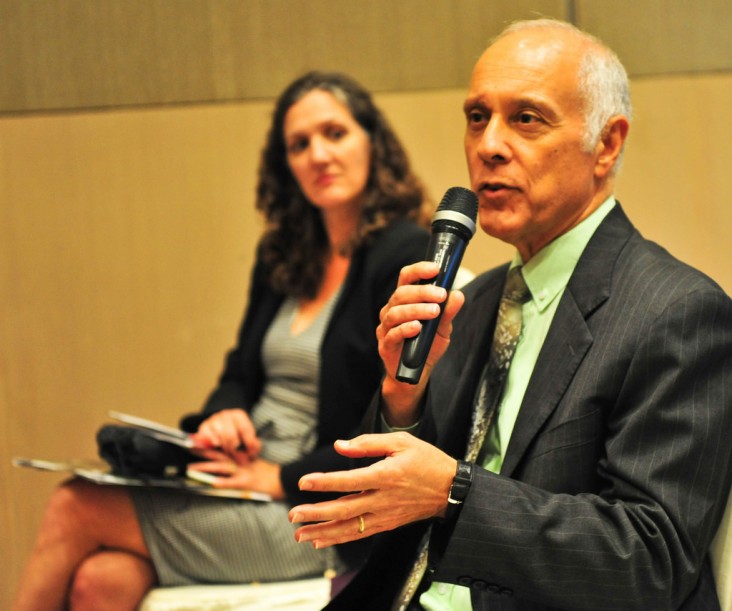Home » News & Information » Speeches » Remarks by Michael Yates, USAID Regional Development Mission for Asia Director at the launch of the USAID-funded Asia’s Regional Response to Endangered Species Trafficking Program WildScan App
Wednesday, September 17, 2014
Subject
Wildlife Trafficking

USAID Regional Development Mission for Asia speaks at the WildScan app launch.
Richard Nyberg/USAID
Today’s launch of the WildScan Mobile Application marks a major milestone in ASEAN-WEN’s efforts and continued collaboration to put an end to wildlife trafficking in the region, and around the world.
Wildlife trafficking will remain a major global threat to species loss, ecosystem degradation, and to human health and security – unless we work collaboratively with all key stakeholders, as one community. This is what brings us together today – a common cause, and a shared commitment.
Here in Asia, we all have already gotten started with ASEAN-WEN, which we think is a model for effective cooperation. It brought the Convention on International Trade in Endangered Species of Wild Fauna and Flora, or CITES, together with police, customs, and the other law enforcement agencies to combat illegal wildlife trade in the region.
As part of its important mission, ASEAN-WEN promotes the implementation of national and international wildlife protection laws and treaties, with the long-term goal of reducing – or one would hope, eliminating – the illegal wildlife trade in Southeast Asia. It works to dismantle the region’s major wildlife trafficking networks.
The U.S. government remains committed to support ASEAN on its anti-wildlife trafficking efforts. In part, we do this through USAID’s Asia’s Regional Response to Endangered Species Trafficking, or ARREST program.
ARREST has reached more than 740 million people through consumer awareness campaigns, and helped to improve the capacity of hundreds of key officers throughout Asia to stop illegal wildlife trafficking. It works with experts in the region to develop and apply innovative, accessible and easy-to-use technological tools, like WildScan, that help law enforcement officers and the public to curb illegal wildlife trafficking more effectively. We will also translate the WildScan app and provide training in its use so that law enforcement officers and everyone else can use it across Asia, to quickly identify and report animals caught in the illegal wildlife trade.
USAID around the world is doing more to harness the power of technology, including mobile technologies, to improve peoples’ lives, and WildScan is a great example of how this can be done.
Reports from WildScan, including crowd-sourcing information from the public, can help us to understand more about trafficking hotspots, and use that information to focus law enforcement on addressing large criminal syndicates.
It is indeed a valuable tool that will contribute to ASEAN-WEN’s ongoing, extensive efforts to tackle large-scale wildlife crime, and the global efforts resulting in major wildlife seizures.
We hope you will all help to promote the use of WildScan and take the opportunity today to try it yourselves. Together, we can get wildlife trafficking on our collective screens and find smart solutions to help put an end to it across Asia, and beyond. And we must do this with urgency, given the disturbing increases in wildlife poaching around the world.
Finally, we are looking forward to seeing ASEAN’s WEN continue to grow and strengthen as a leader in wildlife protection efforts in the years ahead.
Thank you.
Bangkok
Issuing Country
Related Speeches
- 6th Mara Day Celebration - Remarks by Brad Arsenault, Deputy Director for East Africa and Operations, Environment Office, USAID Kenya and East Africa
- Remarks by Ms. Polly Dunford, Mission Director, USAID Cambodia, Handover of Forest Community Patrol Equipment
- Remarks by Menglim Kim, Project Management Specialist, USAID Cambodia, National Reflection and Learning Meeting Sub-National Authority and Community Engagement for Improved Natural Resource Governance and Practices







Comment
Make a general inquiry or suggest an improvement.